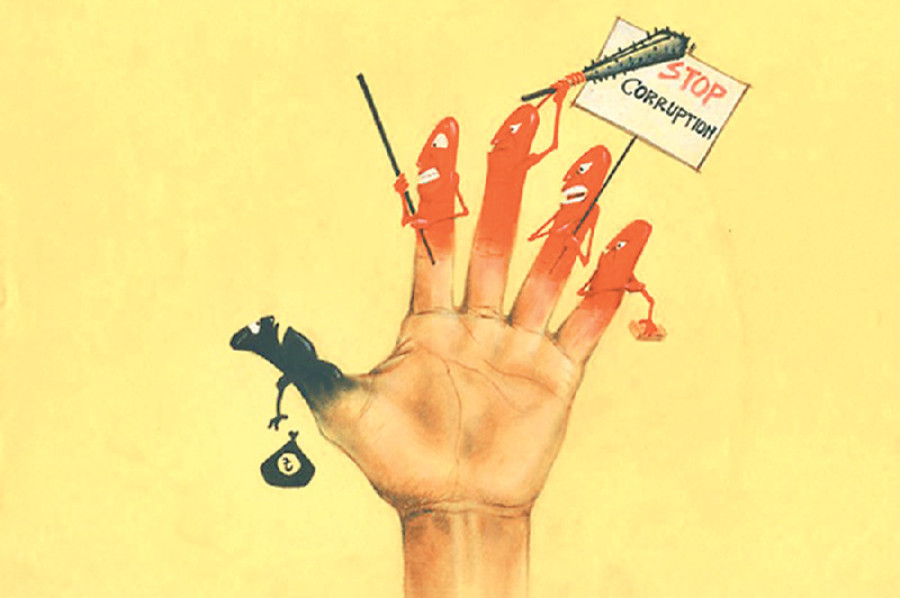Opinion
Legal corruption
Politicians get millions for medical care while poor patients die for lack of money
Kahar Singh Khadka
Last month, there were two scandalous events that received uneven coverage in the media. The first one, which was highly publicised, was the government’s decision to provide Rs5 million to former deputy prime minister and Nepali Congress leader Sujata Koirala for cancer treatment despite a huge public outcry. And the second, which was barely reported by the media, was a suicide committed by a patient named Anuj Bishwash at Birat Nursing Home. He had jumped out of a third-floor window for being unable to pay his hospital bills. These two instances are a true picture of how different social classes receive medical treatment. They not only illustrate the widening inequality between the elite and the general public in terms of access to health care, but highlight the exploitation and victimisation between the two social strata.
In Nepal, it appears that people are destined to be exploited by a few who are bent on taking advantage of every available resource. While our rich politicians have been receiving huge amounts of money from the state coffers for medical treatment in foreign countries, poor people are compelled to sell their meagre properties to pay their medical bills. Some even resort to killing themselves to free their family from financial burdens. Sometimes, it becomes the duty of the government to pay the medical expenses of people who have made a great contribution to the country. But this only applies to personages who cannot afford the costs. But the case here is different. Regardless of their fat bank balances and many other assets, our politicians never hesitate to dip into taxpayer money. They demand the money from the state as if it is their right. Such practices are a violation of the public’s right to equal access to health care.
Cancer treatment
Millions of rupees have thus been allocated from the state treasury to political leaders and their cadres. Recently, the government had also provided Rs6 million to former president Ram Baran Yadav for cancer treatment abroad. While all kinds of medical services including cancer treatment are available in Nepal, the trend of going abroad for medical treatment by misusing taxpayer money has not stopped. In fact, it is on the rise. Political leaders have been zooming off to foreign countries for simple medical conditions that can be easily cured in Nepal. Nepali doctors have criticised such tendencies among politicians and said that different kinds of medical services are available in Nepal. Why do our leaders prefer to get medical treatment overseas? Everybody can easily answer the question. It is because they do not have to spend their own money and can get the treatment free of cost in foreign countries.
While the number of leaders travelling abroad to receive medical attention has been swelling, ordinary people who are suffering from cancer are forced to crowd into the few hospitals that offer radiotherapy service. Due to the negligence of the concerned department, radiotherapy services are not currently available at all the cancer hospitals. For the last few months, two radiotherapy machines at BP Koirala Memorial Cancer Hospital and one at Bir Hospital have lain inoperative. So there is an overflow of patients at Bhaktapur Cancer Hospital. People have to wait for weeks to get radiotherapy service at the government hospitals, and such delays in getting treatment will raise the chances of the cancer spreading. Recently, a private cancer hospital has started offering services in Kathmandu with many kinds of treatment facilities, but it is very expensive compared to government hospitals.
Unanswered questions
As there are no definite rules and criteria for the issuance of medical assistance, influential leaders have been trying to get all the money they can from the government. Treatment expenses are being distributed in a discriminatory way. Some have been given a lot while others have received very little. The process of allocating money has not been done in a transparent manner. The recipients of the largesse do not have to submit details of how they spent the money. How much do they actually need? And what if they have money left over? Do they refund it? Do not they need to get a recommendation from the concerned agencies? These questions remain unanswered.
The Health Ministry has recently made a praiseworthy move. It submitted a guideline setting a ceiling on the amount of aid that the government can give for medical treatment. But the Cabinet decided to give the money to Koirala by bypassing the Health Ministry’s proposal. Many times in the past, the government has not followed instructions given by parliamentary committees to go through the Health Ministry while issuing cash gifts. As decisions made by the executive branch cannot be investigated by watchdog agencies, they are legally committing corruption in the guise of issuing medical assistance. This is abuse of power within the provisions of the law for private gain, especially for political leaders, their cadres and relatives. It is legal corruption. In order to stop this practice, the other two state organs should take up the matter seriously.
Khadka is chairperson of Prakriya Nepal, an NGO working in the field of health, education and consumer rights




 19.13°C Kathmandu
19.13°C Kathmandu










